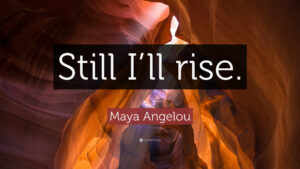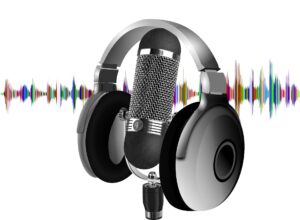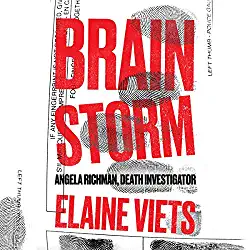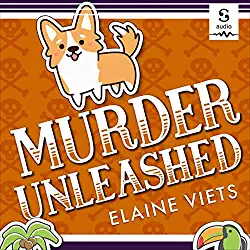 By Elaine Viets
By Elaine Viets
We talk a lot about the writer’s voice, and how we develop our own.
But some readers want more than the writer’s voice on the page. They want to hear the writer’s actual voice.
They want to know what this author sounds like. Is their voice high and reedy, low and sexy, gruff, educated, or sweetened with a soft Southern accent?
When writers read their own work for audio, we readers hear their voice in our head every time we pick up their book. It changes the book: now the writers are speaking directly to us.
Their writing becomes more personal, more intimate.
We expect entertainers to be good at reading their own books for audio, and most are. Listen to Tina Fey read her book, “Bossypants.” Trevor Noah is terrific reading his “Born a Crime.”
And hearing Maya Angelou read her poem, “Still I Rise” brought tears to my eyes.
 But what about ordinary writers? Should we read our own work?
But what about ordinary writers? Should we read our own work?
Some years ago, I read my first four Francesca Vierling mysteries for audio. It was hard work. I was exhausted when I finished each day. I read my mysteries in the studio for six to eight hours a day.
Want to know what it’s like to read an audio book?
Okay, read this blog out loud, down to this line – without a single stumble, pause or mispronunciation. Go ahead. I’ll wait for you.
Start reading now. In three. Two. One.

Difficult, isn’t it? Every time you make a mistake, the producer has to stop the recording, back up, and have you start again.
I decided to read my first four mysteries because I’d had speech lessons in New York. To get ready for the studio, I went into training. I printed out the books in manuscript form and read from them several hours a day, to be familiar with the words. I outlined each character’s part with a special colored pencil, so I could change my voice at the right time.
I wrote notes at the top of the pages to remind myself. Mostly, SLOW DOWN!!!!
Finally, I thought I was ready. I flew to Santa Fe, New Mexico to begin reading in the studio. Santa Fe is a much drier climate than I’m used to, and my throat quickly turned scratchy. Now I sympathized with singers who babied their throats.
I had a patient producer and the reading went fairly smoothly. I followed the advice of some pros and drank warm water with lemon. No sugar, no tea, just warm water and lemon. I swilled gallons of the stuff. After a while, my mouth puckered when I even saw a lemon.
 When I finished, I needed to put my tongue in a sling. My sore, scratchy throat took weeks to recover.
When I finished, I needed to put my tongue in a sling. My sore, scratchy throat took weeks to recover.
I was lucky to get kind reviews for my work, but when it came time to read my other mysteries, I left that to the pros. Tanya Eby and Amanda Stribling read many of my books now. Why did I stop reading my work?
Because I was good, but not quite good enough. And I wanted the best for my work.
So what about you? Have you read your own work for audio? Do you have a favorite audio reader?

Listen to my audio books free during your 30 trial with audible.com. Listen to my Dead-End Job mysteries, Josie Marcus, Mystery Shopper mysteries, and the Angela Richman Death Investigator mysteries. https://www.audible.com/author/Elaine-Viets/B001HD2WX2


I don’t listen to audiobooks personally but can’t deny how increasingly popular they have become. It makes sense to offer our books in a variety of formats. As a reader, I don’t think I’ve ever had an urge to hear the author’s voice. I just want to read & disappear into the author’s fictional world.
And kudos to any author who has the patience to sit in a studio for hours on end recording those books. It sounds like most people have to book a studio, so there isn’t a cost effective option for recording in smaller chunks, & getting someone to record for you just adds more expense.
I found it very interesting that water with lemon is recommended to help you get through those long hours of reading. I drink water with lemon every day–room temp, not warm, but you have to be careful because especially when you first start drinking it, the lemon juice can trigger a coughing spell when it’s most potent and leave a tickle for a while after. But maybe the warm water aspect quells that. And of course as you drink throughout the day, the acidity level goes down.
Not sure I could drink water with lemon every day, BK, but the warm water is soothing.
I don’t think recording your own work would be cost effective, but I read for an audio company and they paid for the studio.
One of my critique partners has started narrating her own audio. I admire her for doing it, but I couldn’t.
I can’t get through a simple ‘read a passage from your book’ at an event without stumbling. And I hate the sound of my voice. So, even though it costs a bunch of bucks to hire a good professional narrator, I leave it to the pros. Steve (Captain) Marvel reads my Mapleton books, Pamela (The Captain’s Voice) Almand reads my Triple-D series.
Hmmm… strange that both have ‘captain’ in their brands. For Steve, it seemed a no-brainer, and Pam used to be an airline pilot.
Kelley Hazen of Storyteller Productions read my Pine Hills Police series.
As far as actually listening to audiobooks, I can’t. My brain isn’t wired that way. My mind wanders too easily. Hearing a word or phrase sends me off on a tangent, down the rabbit hole, and I’m lost.
I like listening to audio books on a long drive, Terry. They keep me focused when I’m fighting traffic, and awake when I can’t drink any more roadside coffee.
My speech teacher told me that most of us hate the sound of our own voice, because it sounds different to us. We’re used to hearing what bounces off our skull bones. You’re a smart marketer, as your blogs have shown, so hiring pros is the right move.
I’m like Terry and can’t listen to a book for the same reason…and also, if I listen when I drive I could kill someone. My books are in audio, but I have no say in who narrates…sigh. And it’s funny but when I write the books, I don’t hear the Southern accent so prevalent in them.
Isn’t weird to hear someone read your work for the first time, Patricia? It was for me.
I wrote a few years ago about recording my own audio book. I’ve done four of my writing books and just need a 25-hour day to do more.
Another tip for long speaking sessions: put a Hall’s Honey-Lemon cough drop in a bottle of water and shake it till it dissolves. Sip that throughout. Repeat as needed.
Now there’s a fresh take on lemon water, Jim.
“Tongue in a sling.” LOL, Elaine!
Nope, never read my own and don’t plan to. I know my limitations and I’d be awful. You’re brave to have narrated but also smart to know when to subcontract that task to others.
Not sure you’d be awful, Debbie, but you’re smart enough to know your limitations.
Audiobooks don’t work for me. My mind wanders. I need to read the words to “hear” the characters. But I enjoyed reading about your experience, Elaine!
Thanks, Sue.
Great post, Elaine. I enjoy listening to audio books. My wife and I listen to them while jigsaw puzzling. We’ve listened to the first four of Joanna Fluke’s Hanna Swenson novels so far in the past few months. The narrator does a fine job, though I get a kick out of how in some of the books she makes Hanna’s 60-year old mom sound 95 and in others a less quavery 60. Comedic effect I think, or the audio producer has been switched out. Not sure which.
I’ve considered reading my own books, but the amount of work involved puts me off. Also, despite being I think good at reading my work in public (eight years of library story times help) it’s not the same thing. So far, I haven’t been able to swing a deal my publishing fund can afford to have the books produced in audio with another narrator. Perhaps that will change. I certainly hope to do so with my library cozies.
Have a wonderful day!
Hope you can swing that audio deal, too, Dale. It’s a real trip to hear someone read your work. I know you’d enjoy it.
Wonderful post, Elaine. Thanks for the information and tips. And congratulations on reading four of your Francesca Vierling mysteries. I don’t think I could get through even one of my books. My voice is low and gruff, and I have too many secondary characters (good excuse, and I’m sticking to it). Since almost all of my driving is short distances, I don’t listen to audiobooks.
I know that audio is growing quickly in popularity, and that I need to be thinking about using it. But when that time comes, I won’t try to do it myself.
Great post!
Glad you enjoyed the post, Steve. When your books go to audio, you might consider giving one a brief introduction.
Good compromise.
Excellent subject, Elaine. Thanks for sharing your experience. I’ll have to try the lemon water trick vs the straight Scotch swilling technique I’m currently using. All kidding aside, I’m keeping a close watch on AI text-to-speech. There’s one new program that sounds really good for non-fiction narrative but the emotional value necessary for fiction isn’t quite there… yet.
The robots will replace us all, Garry. Listen to some sci-fi!
Some channels on YouTube use TTS that’s so good I honestly can’t tell if it’s a human or not. But listening to a narrator with a rich, plummy English accent who actually laughs at what’s happening can’t be replaced.
I like listening to audiobooks when I’m driving or out running. Even doing chores in the house. I thought I might tackle narrating my own novels, but after a brief session of narrating the prologue of the first book, I realized I needed help! I use Findaway Voices to narrate my books.
Findaway Voices looks interesting, Kay.
None of my books went to audio, but it would take a gun to my head to read them, myself. I have read my own material, complete with voices, at reader conventions. I have read a Browning love poem for my brother’s wedding, and people asked me if I was an actor. I did bed time stories with voices, sound effects, and a puppet to great niece and nephew acclaim. But I am not a voice actor, and I know it.
If anyone wants to learn humility, I recommend Jim Dale reading the Harry Potter series. Absolutely every character has a different voice, and he nails each character. JK Rowling has a heck of a lot of characters in every book.
I’m capable of doing a dozen or two accents/dialects. (My Gabby Hayes impression for some reason sent coworkers into hysterics.) I’d like to record one of my novellas, but I’ve experimented enough to know that it would require editing, and I would never try to do a full day. An hour at a time might be my limit. I have the professional level equipment, but would also have to modify a room. (Charlotte Hoather, the English soprano*, turned her entry hall into a sound studio with shower curtains and blankets.)
Like others here, I don’t have the patience to listen to books on tape.
* https://youtu.be/moV9wWgAhoA
Jim Dale’s reading of the Potter novels was masterful, Marilynn. Even seasoned pros are in awe of his work.
I auditioned to read the Jonathan Grave series. They told me I was wrong for the part.
Hahahahahahahaha!!! *snort*
Oddly enough, I have narrated several audiobooks – but not one of them mine. I have been an actress and singer, so the exercise was not altogether unfamiliar. And you are right, it is work. Considerably one of the most popular forms available now, the audiobook is tempting, but the parlous state of my finances and the time/work involved have made me leery of trying. Perhaps that is just an excuse – I much prefer the cozy isolation of my office and the company of my imaginary friends. Perhaps it is age or just plain disinclination but I am currently loath to invest the time, work and money necessary to turn out a good product.